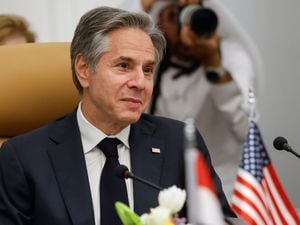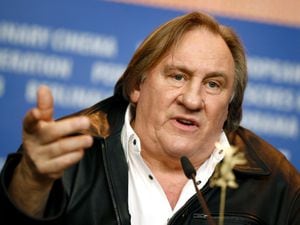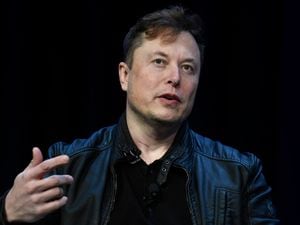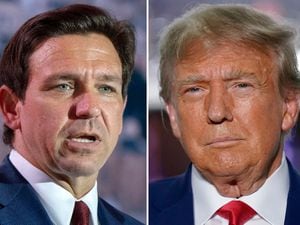Polish PM visits Ukraine in latest show of support for Kyiv against Russia
Donald Tusk is also seeking to resolve differences between Warsaw and Kyiv over grain shipments and trucking arrangements.
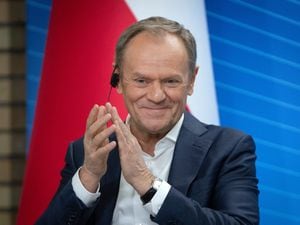
Polish Prime Minister Donald Tusk has vowed to keep supporting Ukraine in the face of the Russian invasion – and to resolve differences between Warsaw and Kyiv over grain shipments and trucking.
Mr Tusk, who returned to power last month and is keen to show that a change in government will not alter Poland’s Ukraine policy, also met his Ukrainian counterpart, Denys Shmyhal.
Mr Tusk said on X, according to comments released by his office: “There are some conflicts of interest, we know it well, and we will talk about them, but not only in the spirit of friendship, which is obvious, but with the attitude to solve these problems as soon as possible, not to maintain or multiply them.
“For me, it is very important to build the feeling that Poland is the most reliable, most stable ally of Ukraine in this deadly clash with evil.”

Ukrainian President Volodymyr Zelensky said Kyiv will get a new “defensive package” from Poland.
He said on social media: “There’s a new form of our interaction for increasing the scale of arms purchases – a Polish loan to Ukraine.”
Mr Tusk’s visit came a day after Moscow-installed officials in eastern Ukraine reported that Ukrainian shelling killed 27 people on the outskirts of Russian-occupied Donetsk.
Kremlin spokesman Dmitry Peskov called it a “monstrous terrorist act”, and the Russia-backed local authorities declared a day of mourning.
The Ukrainian military, however, denied it had anything to do with the attack.

Ukraine’s allies have recently sought to reassure the country that they are committed to its long-term defence amid concerns that Western support could be sagging. UK Prime Minister Rishi Sunak and France’s new foreign minister also travelled to Kyiv in the new year.
Located on Nato’s eastern flank, Poland has been one of Ukraine’s strongest allies. Warsaw has provided weapons and humanitarian aid, and opened its borders to Ukrainian refugees since Moscow invaded on February 24 2022.
However, relations soured last year as economic competition from Ukrainian food producers and truckers angered Poles who said their livelihoods were under threat.
Polish farmers and truckers blocked border crossings, causing back-ups and threatening the flow of some aid to Ukraine.
The farmers had complained that imports of Ukrainian foods had caused prices to fall, hurting their incomes, while truckers said they were being undercut by their Ukrainian counterparts.
The issue surfaced during the war as Ukrainian ports were blocked and food producers turned to road routes through Europe to get their products to market.
At one point, Poland and some other European nations banned Ukrainian grain imports because of the trade dispute.
Poland’s farmers and trucks have ended the protests for now, but Mr Tusk is seeking ways of addressing their concerns.
He has said Warsaw wants to help Ukraine economically but not at the expense of Polish businesses. He has suggested that Kyiv needs to better regulate its trucking industry.
Mr Tusk is also scheduled to honour the country’s fighters and attend observances of Ukraine’s Day of Unity, which commemorates the merger in 1919 that brought together its eastern and western regions.
As part of the celebration, Mr Zelensky signed a decree that, among other things, instructs the government to preserve the national identity of Ukrainians living in border regions that are now part of Russia, such as Belgorod, Kursk and Briansk. Some of those areas have recently been targeted by Kyiv’s forces.
The decree also aims to establish a centre for investigating crimes against Ukrainians on those territories, including forced Russification, political persecutions, and deportations.
In other developments, Ukraine’s air force said it intercepted all eight Shahed drones that Russia launched overnight over southern and central regions of Ukraine.
Debris from three drones shot down over the central Dnipropetrovsk region started a fire at an unidentified business, but no casualties were reported.
Elsewhere, United Nations High Commissioner for Refugees Filippo Grandi visited Kharkiv on the third day of his tour of the country. The second-largest city was among the targets of a January 16 Russian missile attack that injured 17 civilians.
Later, Mr Grandi visited children at a school that has relocated to the city’s subway system.
Meanwhile, major Ukrainian digital banking platform Monobank said it came under a massive denial-of-service attack by unidentified hackers. The attack was successfully repelled, the bank said, with no major consequences.

